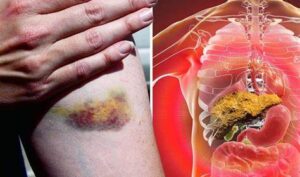8 Early Signs of Liver Damage
Signs of Liver Damage
Liver damage can often go unnoticed in its early stages, but there are certain signs that may indicate a problem. Here are 8 early symptoms to watch for:
- Fatigue
Constant tiredness or feeling unusually fatigued, even after rest, is one of the first symptoms of liver damage. The liver plays a key role in energy production, and when it’s impaired, the body struggles to maintain energy levels.
- Jaundice (Yellowing Skin and Eyes)
Jaundice, the yellowing of the skin and eyes, it appears when the liver can’t process bilirubin, a substance formed by the breakdown of red blood cells. This results in a buildup of bilirubin in the bloodstream, showing a yellow tint.
- Abdominal Pain or Discomfort
Pain or discomfort in the upper right side of the abdomen can be an indication of liver inflammation or enlargement. The liver’s location and size make it prone to pain when stressed or damaged.
- Swelling in the Abdomen (Ascites)
As liver function declines, fluid can build up in the abdomen, leading to noticeable bloating or swelling. This is a momentous sign that needs instant medical attention.
- Dark Urine
Dark, tea-colored urine may indicate liver dysfunction. When the liver fails to process waste properly, excess bilirubin can end up in the urine, causing a darkened color.
- Nausea and Vomiting
Ongoing nausea or vomiting, especially after meals, can be a sign of liver issues. This occurs due to the liver’s reduced ability to detoxify the body and process food.
- Itchy Skin
Chronic itching, also known as pruritus, can result from the liver’s inability to properly eliminate bile salts. This causes a buildup of toxins under the skin, leading to itching.
- Unexplained Weight Loss
Unexpected weight loss, especially when accompanied by other symptoms like fatigue or nausea, could point to liver disease. The liver is responsible for processing nutrients and regulating metabolism, and its dysfunction can lead to significant weight changes.
If you notice any of these signs, it’s crucial to get medical advice for right diagnosis and treatment. Early detection of liver damage can save more serious complications.
